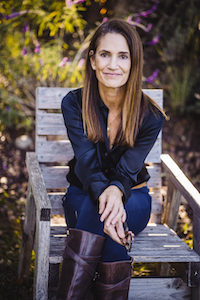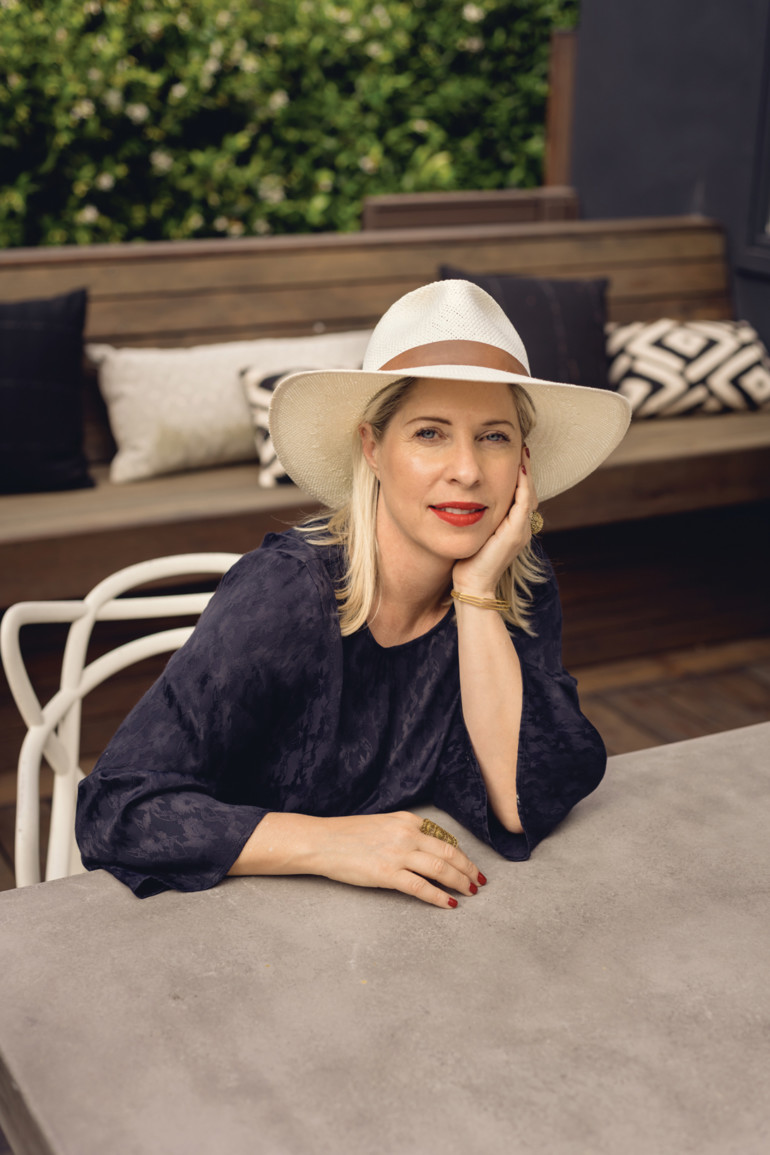FOR THREE DECADES, Tiffany Shlain has been a poster child for the utility and promise of technology. As a Redwood High student in the late ’80s, she co-wrote a paper entitled “Uniting Nations in Telecommunications and Software” and traveled to the Soviet Union as a young tech ambassador. After studying filmmaking at UC Berkeley in the ’90s, she established herself as a new media thought leader, using then-emerging tech platforms to create and distribute CD-ROMs and films through her Let It Ripple studio. She founded the Webby Awards in 1996, and Newsweek deemed her one of the “Women Shaping the 21st Century.”
Now, with her first book, 24/6: The Power of Unplugging One Day a Week (published by Simon & Schuster last month), Shlain has written a guide to creating boundaries in the face of omnipresent technology. For the past decade, Shlain, her husband and two daughters have turned off their screens for 24 hours every week, from Friday evening to Saturday evening, in a practice they call Tech Shabbat. We sat down with Shlain to hear more about her book, which explores the history of Shabbat (and other religious and cultural days of respite), the trajectory of technology in society, and the “ripple” effect the practice of Tech Shabbat has had in her life.
How did you and your family develop the idea of Tech Shabbat?
Ten years ago, I went through a one-month period where I lost my father and our younger daughter was born within the same couple of weeks. It was one of those life moments where life was grabbing me by the lapels and saying, “What’s important?” At the time, I was feeling like an emotional pinball machine — responding to every buzz and notification, responding to everyone except the people I love who were right in front of me. That is when we began this practice and now our family has been doing this for almost a decade. It’s been so beautiful and life changing. The practice of Shabbat is thousands of years old — we’re just updating it for the 21st century. I’m Jewish. I’m not a religious Jew, but I love the Jewish traditions and rituals. I would love to see people engage with Marin has always been at the forefront of wellness and living a good life. This is the right community to push back. Shabbat, the way they do yoga and meditation even though they might not be Hindu or Buddhist. They do those practices and it makes their lives better. A full day of rest and being in a different mode — in my family’s case, no screens — has brought a sense of balance back, a space for ourselves, for relationships, and for reflection, space we don’t have in our 24/7 culture. Historically, in every culture and religion, there is a day of rest, but in our current culture, it has evaporated in almost every sector of society.
What are your greatest concerns about our relationships with our smartphones?
I love all the things technology can do, but just not 24/7. I never imagined in the early days when I started the Webby Awards that people would be staring down at their screens all the time and not be present with the people right in front of them. It was never part of the vision — this screen-obsessed world. This book is a call to rethink the way technology has infiltrated our lives and made us accessible to everything and everyone at every waking moment. I don’t think that’s a healthy way to live. I don’t think it’s a healthy way to work. What I’m proposing is a simple, powerful practice that can make you feel so much better. Also, while screen obsession is not great for our personal well-being, it’s also not great for our democracy — being distracted all the time. That is how things don’t happen. You can’t focus long enough or do big- picture thinking or do things in a deeper way. In the book, I talk about the personal but I also focus on our society and free will and government and democracy, all these other very important things that are influenced by the fact that we are manipulated to stare at screens all the time.
Your daughters are 16 and 10. How have they responded to this tradition?
It’s been a special day in our family that feels very different than all other days. We all enjoy it. It is interesting to hear my older daughter’s perspective. She really enjoys having a day without homework, without posting and liking, especially as the stress piles on as she’s getting ready for college. It becomes a respite. It’s our favorite day of the week, and the feeling ripples out throughout the week because every week you get to recalibrate how you feel about everything — a reset.
How do you suggest families handle the peer pressure to get a smartphone?
Children are going through the biggest period of brain development and they’re being handed a device that is completely rewiring their brains. With smartphones, it is peer pressure for kids and it is also peer pressure for adults. When our older daughter was entering elementary school everyone was getting their fifth grader a smartphone for graduation. We didn’t, after a lot of wrestling I never imagined in the early days when I started the Webby Awards that people would be staring down at their screens all the time. with and looking into the issue, but we were one of the only families not getting a smartphone. Now, five years later, I do feel the tide shifting. There is a group of parents who are all signing the Wait Until 8th pledge. A mother out of Austin, Texas, started this and it is sweeping the country. We have so many parents who have signed it at our school, and because I am on the Wait Until 8th advisory board, I know that this is happening all over the country. The research is finally coming out and it confirms what a lot of us instinctively knew — this can’t be good. It was the same kind of hand-wringing over television when I was a kid in the ’70s, but the difference with television is you can’t drag a TV with you everywhere you go, every waking moment. That’s a big difference. So, as a group of parents you say, we’re all going to delay getting them a smartphone — we don’t need to give them access to a supercomputer in their hands all the time at this age. What is so exciting is that parents have had lots of meetings and discussions around the Wait Until 8th pledge, because it is really a community thing. One kid has a smartphone, the others don’t, but everyone wants one. Or with playdates, you establish that kids won’t be staring at screens the whole time. As a community you’re setting boundaries and hopefully letting childhood happen a little longer. They’re all going to get there soon enough. The pendulum swung so far, people don’t want all of it and are starting to push back.
How do you personally handle social media?
I wrestle with social media. I love sharing ideas and most people I follow are sharing ideas. For a filmmaker and writer, there’s so much you can do — testing ideas, follow- ing others. I’m following diverse people on Twitter, so I read things I never would have read. But I’ve been thinking about why people post, when does it feel like healthy posting and when does it feel not healthy. I love seeing my friends’ kids — and I think about that: that compels me to post on my kids’ birthdays. But you can kind of feel it — there’s a level when there’s too much posting. You have to take a beat and ask yourself, why am I posting this? How will it make others feel? I don’t think there’s a lot of that. In the book, I write about strategies for different social media platforms, including taking complete breaks.
If you could go back and give your younger self advice about technology, what would it be?
I always looked at tech as a way to bring us together, and tech has brought so much. I work in technology. I make films about it. I spent the first half of my career thinking, “This is going to change the world.” And now it’s like, not so much … that was a little too much. I didn’t imagine every second of life would be responding to this device. I never thought connecting broadly would be at the expense of connecting deeply. So how do we keep all the best parts — connecting through similar interests, sharing ideas on a large scale — without letting it consume and take over every waking moment? Marin has always been at the forefront of wellness and living a good life. This is the right community to push back. We are surrounded by so much nature, so much beauty here. We need to look up and see where we’re living and turn it off occasionally, weekly. The key is you can adapt this practice to your life, pick a differ- ent day of the week. The book is asking people to try it, consider how you feel, and then adapt it to how it best works for you.

Kirsten Jones Neff is a journalist who writes about all things North Bay, with special attention to the environment and the region’s farmers, winemakers and food artisans. She also works and teaches in school gardens. Kirsten’s poetry collection, When The House Is Quiet, was nominated for the Northern California Book Award, and three of her poems received a Pushcart nomination. She lives in Novato with her husband and three children and tries to spend as much time as possible on our local mountains, beaches and waterways. For more on her work visit KirstenJonesNeff.Com.


